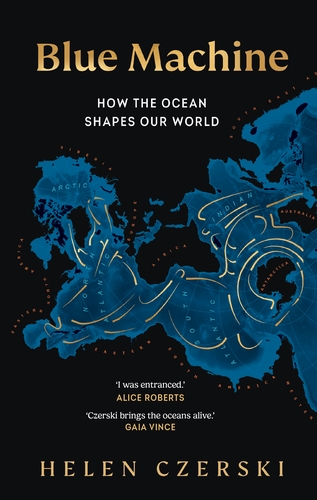If you cannot even step into the same river twice, how to take the measure of the ocean? Dipping your toes at the beach is irresistible, but uninformative. Sampling stuff out at sea helps more, but you have to get serious. Consider the Continuous Plankton Recorder (CPR), a device designed in the 1930s for recovering plankton from the open ocean. They are cruising along, tethered unobtrusively behind cargo ships and hauled in from time to time to assess their microscopic catch.
By 2021, Helen Czerski tells us, CPRs had been towed for 7 million nautical miles, which would take them 326 times around the world. Someone – in this case a team of researchers in Plymouth – then needs to examine, classify and count the contents of each trawl.
That still accounts for just a small fraction of the ocean, an interconnected mass of salt water thousands of miles in extent. As anyone who has looked properly at a globe, or studied the pictures of our planet from space, knows, water covers almost three-quarters of the Earth’s surface. And although on a planetary scale it is just a smear of moisture, it is still deep beyond human ken – the average depth of the whole lot is 3.68 kilometres. Down there, there are water movements vaster than empires and more slow, currents of matter and energy with a global reach.
Modern ocean science, combining local measurements, long-haul efforts like CPRs, and new remote observations from surface probes and satellites, has pieced together a grand picture of this vital part of the Earth system, so often unregarded by landlubbers. And Helen Czerski, urging us to see the ocean as a presence, not an absence, has done a remarkable job of shoehorning an overview of the whole shebang into a single, very readable volume.
 Czerski is a physical oceanographer, and frames the ocean as a heat engine, the blue machine, driven by the difference in solar heating between the equator and North and South poles, with complications from tidal forces, wind, differences in salinity – which, like temperature, affects density – and shape of continental land masses and undersea crust. They generate complex effects, some fast and some unfolding very slowly, in a great, layered mass of water that is in constant motion.
Czerski is a physical oceanographer, and frames the ocean as a heat engine, the blue machine, driven by the difference in solar heating between the equator and North and South poles, with complications from tidal forces, wind, differences in salinity – which, like temperature, affects density – and shape of continental land masses and undersea crust. They generate complex effects, some fast and some unfolding very slowly, in a great, layered mass of water that is in constant motion.
Although physics is her touchstone, Czerski weaves in plenty of marine biology, along with personal encounters with the ocean as a diver, rower, or scientist on a research ship navigating between ice floes, and encounters with other intrepid researchers working on the surface or down in the depths. Her intense involvement with Hawaiian canoeists, tapping the energy of the ocean waves to move faster than seems possible, allows her to wax lyrical about the lessons of teamwork. And it underscores her message that a removed scientific understanding of the ocean is a poor thing without engaging with it more directly, physically and culturally.
It all adds up to a persuasive case that Earth-dwellers need to understand the ocean and work with it, a message that gains urgency from the way people are now changing the whole system. More than 90 per cent of all the extra energy our atmosphere has trapped as we have increased its load of carbon dioxide and other greenhouse gases is stored in ocean waters as heat. That is affecting the whole, vast, intricate, machine, with untoward effects on climate and ecosystems.
Her brief conclusion rightly details these effects, and others from our relentless harvesting of ocean life and reckless treatment of the sea as a dumping ground for stuff we no longer care to keep with us on land. Like land-oriented eco-advocates she advocates a shift in values where people become stewards, not exploiters of the ocean. That plea is all the more powerful because of the majesty of the view of the ocean system that science now affords. This brilliantly organised account of it will change the way you see the world, and its colossal oceanic expanses. There is indeed a great blue engine, regulating the circulatory systems of our home world. It is, as Czerski puts it, the beating heart of the planet.
- Blue Machine: How the Ocean Shapes Our World by Helen Czerski (Penguin, £20)
- More book reviews on theartsdesk















Add comment